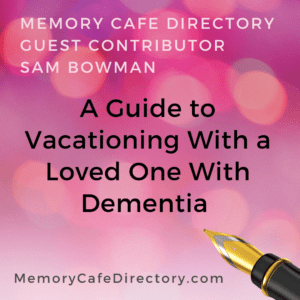Memory Cafe Directory posts and/or links to retailers can be advertising, sponsored, or affiliate links. We may earn a small commission from them. Thank you.
Dementia is a challenging condition that affects many of the world’s population. Astonishingly, the Alzheimer’s Association has reported that one in three older adults will ultimately succumb to dementia. While these are sobering facts, it does not mean those living with this condition can not live fulfilled lives.
One way caregivers can help is by introducing travel and staycations to their routine. These activities can be a great source of escape, especially for those who are showing signs of depression and anxiety. It can also provide them with positive stimulation and social interactions that can help improve their well-being.
Let’s look into valuable insights on how to plan for a successful trip with people suffering from dementia and some potential staycation ideas if you find traveling too daunting.
Understanding the Challenges of Planning Your Trip
Many challenges can occur when traveling with a loved one with dementia. That is why organizing the vacation ahead of time is crucial to reduce any unexpected issues. Here are some common challenges you may face during your travels:
Difficulty with Transportation
People with dementia may have issues understanding and following transportation instructions. It is essential to plan for this ahead of time and make necessary arrangements to avoid any confusion or delays.
Sensory Overload
Busy airports, loud noises, and bright lights can be overwhelming for individuals with dementia. Packing noise-canceling headphones and sunglasses can help reduce sensory overload.
Change in Routine
Individuals with dementia thrive on routines, so changing their daily schedule can cause distress and confusion. It is essential to plan out the trip’s itinerary carefully while also allowing room for flexibility and breaks.
Setting the trip’s expectations and planning the itinerary together can also help alleviate any anxiety they may have around traveling.
Travel Safety for Adults with Dementia
Ensuring the safety of your patient during travel is paramount. Simple precautions can make a significant difference in your trip, so here are some tips that can help your loved ones stay safe while on the road:
Medical ID Bracelet
Ensure your loved one wears an ID bracelet with essential information, including emergency contacts and medical conditions. If they get separated from you, this vital information can help others assist them effectively and reduce the stress from this situation.
Car Travel Tips
To reduce anxiety, make the car environment comfortable with familiar items, like their favorite cushion or a soft blanket. Frequent bathroom breaks and stretch stops can also contribute to their comfort and well-being during the journey.
Airline Travel
To avoid any issues with airport security, bring a doctor’s letter and any necessary medical documents. Additionally, consider requesting special assistance from the airline to help you quickly get through check-in and boarding procedures.
Memory-Aid Devices
Consider using memory-aid devices like GPS trackers and smartphone reminder apps to help keep your loved ones safe and oriented during the trip. These devices can provide peace of mind and ensure you can locate them if they become lost.
These safety measures may seem minor, but they can significantly impact your loved one’s travel experience. They may also help lessen the confusion and anxiety these new environments can trigger.
Making the Trip a Success
Vacationing with a dementia patient can be successful with proper planning and understanding. Let’s look at some ways you can make your trip successful:
Create a Familiar Environment
To provide comfort during the trip, bring familiar items like favorite snacks, music, or photographs. These items can serve as connections to their past and create a sense of security.
Establish a Routine
Stick to a familiar routine as much as possible, including meal times and bedtime, to reduce confusion and anxiety. Familiarity and consistency can go a long way in preventing distress. Planning activities your loved one enjoys, such as visiting places they have fond memories of, can also enhance their experience.
The most crucial aspect of successful vacationing with a loved one with dementia is patience. Understand that they may need extra time to process new information and changes in routine. So, be patient, understanding, and flexible during the trip.
Saving Money on Road Trips
Traveling on a budget is essential for many caregivers. By planning ahead, you can save money on road trips and focus on providing the best care for your patient. Here are a few ways you can save during your trip:
Meal Planning
Pack nutritious and easy-to-eat meals, reducing the need for expensive restaurant stops. Also, consider their dietary restrictions and preferences while planning meals to avoid behavioral issues.
Find Affordable Accommodations
Look for budget-friendly accommodations with the necessary facilities for your loved one’s comfort. Many motels and hotels offer discounts for extended stays, which can help you save money in the long run. You can also utilize websites and apps to find the best deals and discounts for older adults.
These money-saving tips can help you create a more enjoyable vacation for your loved ones without having the added stress over finances.
Consideration for Staycations
If a traditional vacation seems overwhelming, consider a family staycation — a relaxing and enjoyable alternative within the comfort of your home. Let’s look at how you can elevate their staycation:
Create a Relaxing Atmosphere
Decorate your home with soothing elements, play calming music, and engage in activities your loved one enjoys. You can make the home environment feel like a mini getaway by rearranging furniture, adding plants, or even creating a cozy picnic space in the backyard.
Plan Meaningful Activities
Cook together, watch favorite movies, or enjoy simple crafts to create cherished memories. This can be an opportunity to reminisce and connect, so capture these moments with photos or journals to document the experiences.
It’s important to remember that individuals living with dementia will have good and bad days. Offering them a staycation will allow them the flexibility to adjust to plans while still enjoying new experiences.
Benefits of Travel with Adults with Dementia
Traveling with a loved one with dementia may come with challenges, but the benefits can far outweigh the difficulties. Here are some of the advantages of taking a trip with someone who has dementia:
Enhanced Quality of Life
Travel can provide individuals with dementia a break from their routine and introduce them to new and exciting activities. These experiences can lead to fulfillment and improved quality of life.
Cognitive Stimulation
Visiting new places and trying new activities can stimulate the brain and promote cognitive function.
Promoting Physical Activity
Travel often involves walking and other physical activities that can benefit the overall health of individuals with dementia.
Social Interaction
Meeting new people and interacting with others during the trip can be socially enriching and boost self-esteem.
Vacationing with a loved one with dementia requires careful planning, patience, and adaptability. Whether you choose a traditional trip or a staycation, the key is to create a safe space for your loved ones. Providing proper care and support can turn a trip into a cherished memory, which can help strengthen your bond and improve their quality of life.
About the Author
Sam Bowman

Sam Bowman
Sam Bowman writes about people, health, wellness, and how they merge. He enjoys getting to utilize the internet for a community without actually having to leave his house. In his spare time he likes running, reading, and combining the two in a run to his local bookstore.
Connect with Sam on LinkedIn.






